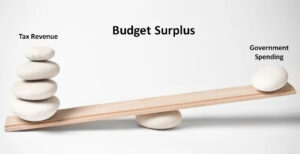The Government announced its much touted Budget, with Mr Chalmers (the Treasurer) claiming to be an economic genius for delivering the first surplus by a Labour Government since Paul Keating in 1989.
We have a more detailed report here, but read our high-level analysis first.
What is a surplus?
In our view, you don’t have to be an economic genius to be able to deliver a surplus in this current environment.
 As we have been advising for some time, the economic background of Australia is still very strong.
As we have been advising for some time, the economic background of Australia is still very strong.
To give a quick summary for an economy to be in Surplus, it is as simple as the equation:
Revenue (Taxes and the like) Less Expenses (i.e., Government Spending) = Surplus.
The current situation is like shooting fish in a barrel – we have the lowest unemployment rate since the 1970s. We have more people in the workforce (that is higher participation, likely due to the cost of living crisis, which is forcing more people to take up part-time work to be able to pay the bills). We have a shortage of people, with recent reports of more than 50,000 jobs that are still to be filled in the mining industry alone.
The tax increase has been a windfall for the Government on the back of:
A) Income Tax:
- More people working means more people are paying taxes.
- Higher rents also mean lower negative gearing losses (that is, the return on rental properties has increased)
- Higher wages also mean more people in the next tax bracket, which goes up the more you earn.
- The current housing prices are increasing, which means more capital gains tax.
- On top of this, fewer people are on Centrelink welfare, so another win for the Government.
B) GST:
- The more income that people have, the more they are spending. So, then there is more GST collected as the economy grows.
We just hope that Mr Chalmers doesn’t replicate what the last Labour surplus was in 1989.
The following year in 1990, we had what Mr Keating classed as “The Recession We Have to Have.”
Some clients weren’t born when that occurred, but they will recall parents and grandparents remembering interest rates in the 1990s at 17%. Let’s hope that history does not repeat itself.
Onto the budget – nothing to see here, folks!
The budget was really a budget about nothing.
The big change that we have noticed is that there is more money being allocated to the ATO and other regulatory departments to conduct more audits and reviews and data matching to make sure that the ATO collect all of their tax and GST and keeps people compliant.
We summarise a number of the areas as follows:
1) Tax Rates:
Most clients know that we watch tax rates and tax regulations fairly closely.
The good news is that the tax rates announced and passed during the COVID Pandemic to start on 1 July 2024 are staying in place.
As a refresher, the table below summarises the middle tax bracket removal.
No changes to incoming tax rates from 1 July 2024
| Marginal tax rate* (%) | Thresholds – income range 2022-23 to 2023- 24 ($) | Marginal tax rate* (%) | Thresholds – MTR* (%) and income range from 2024-25 ($) |
| 0 | 0 – 18,200 | 0 | 0 – 18,200 |
| 19 | 18,201 – 45,000 | 19 | 18,201 – 45,000 |
| 32.5 | 45,001 – 120,000 | 30 | 45,001 – 200,000 |
| 37 | 120,001 – 180,000 | – | |
| 45 | > 180,000 | 45 | > 200,000 |
| Low-income tax offset (LITO) | Up to 700 | LITO | Up to 700 |
| *Excluding 2 per cent Medicare Levy | |||
2) Superannuation:
The much-touted $3m Superannuation cap, which caused a lot of angst for clients and within the adviser/accountant community, came out with an additional 15% tax for those with earnings over and above $3m (and only on the excess).
It is another case of an additional surcharge for those with more significant balances, but at least it isn’t the worst case that we had to consider of clients having to move funds out of Super.
On the face of it, Superannuation will still be the most tax-effective vehicle, even at an extra 15%, as the tax outside Super is still higher than 30% when you have income over $45k.
3) Cost of Living:
There are some Cost of Living small amounts of money in the budget to help pensioners and others on lower incomes.
 The significant change is in pharmacies. We have several clients in the Pharmaceutical Industry, and they provide a valuable service to assist the community with health care.
The significant change is in pharmacies. We have several clients in the Pharmaceutical Industry, and they provide a valuable service to assist the community with health care.
The Government has announced a cut in their funding to allow for 60 days’ worth of scripts to be paid to the pharmacy to help with scripts.
There are a raft of issues with this, which range from the cost of delivery (so some Pharmacies won’t be able to deliver drugs to their customers in need) to customers wanting to keep 60 days’ worth of drugs (instead of 30 days if they are monthly).
We can’t understand the Government’s stance when on the one hand, they are pushing free Flu Shots to be administered by pharmacies. Still, then on the other, they are taking funds away from pharmacies for the day-to-day administration of services.
4) Businesses:
The announcements for business were not much, and the Government appears to have wound back some of the previous write-offs and incentives.
The Government has not extended the following:
- The Instant Asset Write-Off, as it stands, finishes on 30 June 2023.
- The Technology Boost of an additional 20% on the cost of software and other technology to help with the business now ends on 30 June 2023.
- The Skills Boost, which provides an additional 20% for the cost of training and development of staff, ends on 30 June 2024.
New initiatives at a high level:
- A new Asset Write-Off starts from 1 July 2023, allowing small businesses with a turnover of under $10m to write off assets costing less than $20,000.
- An extra tax deduction for assets that are “Energy Efficient” for businesses with less than $50m turnover, and up to $100k asset purchase. The amount of the additional tax deduction is 20% of the cost (net of GST).
5) Aged Care:
There is more money for Aged Care, but the details of how this will play out are sketchy.
We will send more detail in due course. Any clients with concerns in this area should contact us to assist you.
6) Housing & the Housing. / Rental Crisis:
Not much has been done for the housing and rental crisis.
The current issue is the lack of housing available. So, this is a supply issue, as not enough houses are being built.
 The announcements from the Government are to:
The announcements from the Government are to:
- Expand the First Home Owners Guarantee schemes that already exist.
- Increase the tax deductions for building a house for what is termed “Build to Rent” to try to encourage investors to build rental properties.
The Government already has the NRAS Scheme (National Residential Affordability Scheme), which is now closed. So, this would have been a better program to reignite.
The issue we see is that banks are still not lending to people who want to build investment properties (not investors, nor developers, nor builders). So, we doubt that any of these announcements will have any significant impact.
As with all budgets, any changes need to be approved and made law. This hasn’t occurred yet, so we will wait to see what happens next.
Please contact our team if you have any queries or need assistance.
With compliments,
Simon Chesson
MD




